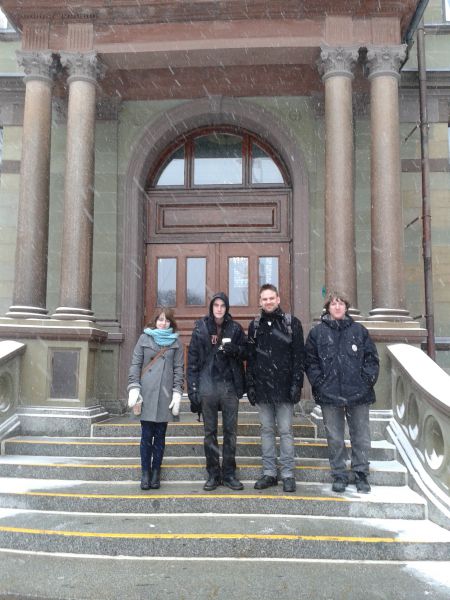K'JIPUKTUK (HALIFAX) – Over two months have passed since a controversial article by the minister of health and wellness incited tensions which remain high because of perceived charges against the poor – or those who practice poor health.
ACORN Nova Scotia has released a letter criticizing Minister of Health and Wellness Leo Glavine (MLA of Kings West) for his February article in the Kings County Register. It dares him to try living on income assistance for six months in order to see “how hard it is to pay your regular bills and buy healthy food that will last month to month.”
ACORN Canada is an independent national organization of low- and moderate-income families. The organization has over 59,000 members in nine cities across Canada. Their mandate is to work towards social and economic justice.
Glavine’s article discusses his position as minister of health, stating that his job is “to improve the health of all citizens.” He writes that in order to do this, we must look after our own health. “Healthier citizens would mean more money and time available for those who require immediate medical intervention,” he writes.
He continues by targetting people on income assistance. “Then there are people who are cognizant abusers of the system,” he writes. “They accept government assistance, yet still have money to travel. These people are abusing their neighbours’ hard-earned money. The goal of assistance programs is to help people out of a difficult time, not give people free money.”
Almost a month after his first article, Glavine issued another in response to criticism, acknowledging social determinants of health. It started off by stating: “Recently, I've made some strong statements about the need for Nova Scotians to take better care of their own health. I'd like to take this opportunity to emphasize my point, which is simply this: everyone is responsible for good health in this province.”
However, his words weren’t taken well by all.
Jonethan Brigley and Scott Domenie, authors of the ACORN letter and leaders of its Nova Scotia chapter, say they were upset by the minister's comments.
“When I first read this article I felt kind of offended,” says Brigley. “Because before I got my job, which was only two months ago, I had been on assistance for a couple years.”
Brigley says the first article angered him because it didn’t give the voice or opinion of anyone who has or was living on income assistance.
“It’s really stressful living on assistance because you’re always wondering how long your food is going to last, what expenses you need to get around, [and] you have to be able to pay rent,” he says.
He adds it is especially stressful if certain circumstances are out of your control, such as the rising cost of rent or food prices. Assistance does not increase in proportion to price hikes, says Brigley.
“So you’re still taking more money that you’re getting for food to put into stuff you need to travel to go find work ... it is very strenuous on the mental state.”
What is income assistance?
Income Assistance (IA), also known as social assistance, income support or welfare, is a program set in place by the government to financially help individuals who may be struggling with their basic financial needs. As stated on the provincial Community Services website, income assistance provides people with their basic needs such as food, rent, utilities (heat, electricity), and clothing. The program can also help individuals with other essential needs such as childcare, transportation, prescription drugs, emergency dental care and eyeglasses.
“Persons in receipt of IA are eligible for a shelter allowance (which can fluctuate based upon the person’s shelter costs) and a personal allowance (a set cost that does not fluctuate),” says Elizabeth MacDonald, media relations advisor of Community Services.
Community Services is currently conducting a review of the Income Assistance program, says MacDonald. “And [we] are focusing more efforts on supporting clients to become independent by getting and keeping a job.”
However, those living on income assistance don’t always have the financial flexibility to make healthier choices. Buying a gym membership or buying healthier foods can sometimes be financially unfeasible.
Government help
There are many barriers to practising good health for low-income families, says Dr. Strang, Nova Scotia’s chief public health officer. He says the government has plans to help not just those who are income assistance, but all Nova Scotians live a healthier lifestyle.
“We have to acknowledge the complexities of low-income groups around issues like this, and single solutions are not likely going to be a benefit,” says Strang.
“I would also argue, that we need to think more broadly around what it means for people to be physically active. So, we are taking a lot of focus on how do we build opportunities for people to incorporate physical activity in their daily lives.”
Both Strang and Glavine have talked about the recent program Thrive, which aims to help Nova Scotians make healthier life choices.
“We are providing funding to municipal recreation departments, so they can have some hours during the week for their recreation facilities […] where there is no cost to attend,” says Strang. “Hopefully it makes it easier for [low-income families] to use those facilities.”
“We have these broad approaches, but we certainly acknowledge that income is a significant issue and we need to factor that in to ensure our programs are inclusive to income.”
Minister of Health and Wellness Leo Glavine was unable to comment for this story despite requests from the Media Co-op.



